Defence Management: An Introduction
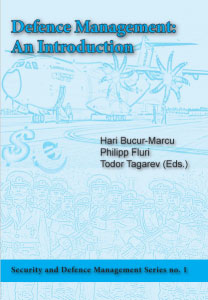
This publication focuses on practical aspects of democratic defence management through the eyes of practitioners. Outlining in simple terms the key issues defence professionals must address to ensure good governance of the defence sector from within the defence establishment, the book provides an introduction to these issues for new defence professionals in transition democracies. The objective is to explain principles and approaches to formulating and implementing security and defence policies, presenting results of policy-related research, and providing examples of good practice in transforming and managing security sector organisations, organisational processes and resources. Intended audience includes practitioners from the legislative and executive branches of government, security and defence professionals and civil society organisations engaged in making security and defence organisations more transparent, accountable, effective and efficient.
Financial Oversight of the Security Sector a Toolkit for Trainers
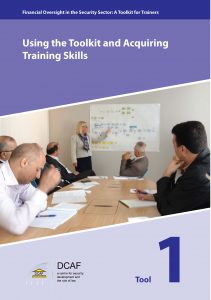
This Toolkit is designed for financial oversight practitioners who wish to gain access to best international practices in financial oversight of the security sector, improve their professional ability to financially oversee security sector institutions, acquire a more proactive attitude towards conducting thorough financial oversight activities of security sector institutions, and assert their authority in scrutinizing budgets and financial operations conducted by security sector institutions.
For more information please
download the document Eng
European Defence Agency Procurement Gateway
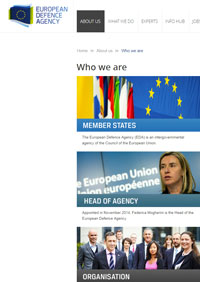
This is a tool that allows open and competitive bidding in defence procurement. The Gateway is held by the European Defence Agency. This tool contributes to the integrity of the decision making process in procurement by making it more transparent.
The tool enables Ministries of Defence in the subscribing Member States to publicise transparently their defence contract opportunities on a single European defence business portal; provides European defence-related companies an equal window of opportunity for accessing defence contract opportunities; encourages transparency and strengthens competition, laying the foundation for the development of the European Defence Equipment Market (EDEM).
For more information please
visit the site
Building Integrity and Reducing Corruption in Defence: A Compendium of Best Practices
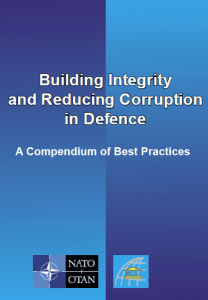
This compendium is the product of cooperation between Transparency International UK, the NATO Program for Peace team, and DCAF. The Compendium focuses on concepts and tools which ensure good practices in defence management and policy through “building integrity.” Designed primarily as an introduction and reference tool, defence personnel, civilians in the defence sphere, democratic institutions, and civil society will also find materials on building integrity and anti-corruption measures which are relevant to their own security governance activities.
NATO Support and Procurement Agency
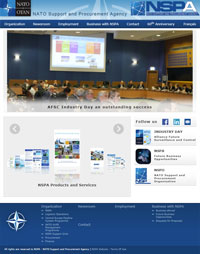
The NATO Support and Procurement Agency (NSPA) is a customer-funded agency, operating on a “no profit – no loss” basis. The NSPA is the executive body of the NATO Support and Procurement Organisation (NSPO), of which all 28 NATO nations are members. The NSPA brings together in a single organisation NATO’s logistics and procurement support activities, providing integrated multinational support solutions for its stakeholders. NSPA provides support to NATO by leveraging capabilities for new customers and geographic areas, and developing new capabilities in the areas of:
- Support to Operations and Exercises,
- Systems Procurement and Life-Cycle Management,
- Fuel Management,
- Strategic Transport and Storage,
- Logistics Services and Project Management.
For more information please
visit the site
Good Practice Guidance on Internal Controls, Ethics and Compliance
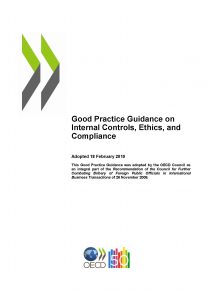
This Good Practice Guidance is addressed to companies for establishing and ensuring the effectiveness of internal controls, ethics, and compliance programmes or measures for preventing and detecting the bribery of foreign public officials in their international business transactions. Guidelines are also addressed to business organisations and professional associations which play an essential role in assisting companies in these efforts. It recognises that to be effective, such programmes, or measures, should be interconnected with a company’s overall compliance framework. This Guidance is intended to serve as non-legally binding guidance to companies in establishing effective internal controls, ethics, and compliance programmes or measures for preventing and detecting foreign bribery.
For more information please
download the document Eng
OECD Best Practices for Budget Transparency
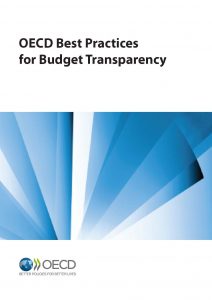
This is a reference tool for member and non-member countries to use in order to increase the degree of budget transparency in their respective countries. The Best Practices are organised around specific reports for presentational reasons only. Different countries will have different reporting regimes and may have different areas of emphasis for transparency. This publication is based on different member-countries’ experiences.
For more information please
download the document Eng
SIPRI Military Expenditure Database
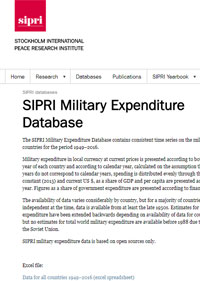
SIPRI data bases can be used for a variety of purposes. Most of all they contribute to transparency and accountability in defence spending and can prove to be of great value in the planning and budgeting phases. They also provide a historical record that serves as a reference for analysing what works and what doesn’t in defence spending.
For more information please
visit the site
Transparency International UK Defence and Security
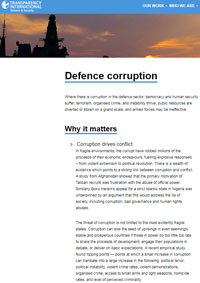
This programme aims to raise awareness of corruption in the defence sector and provide practical tools to reduce corruption risks. TI cooperates with governments and international organisations to enhance transparency in defence institutions; it also works with defence companies to raise industry standards in international defence contracting and develops centres and international networks of defence anti-corruption expertise.
For more information please
visit the site
Guidebook on Anti-Corruption in Public Procurement and the Management of Public Finances
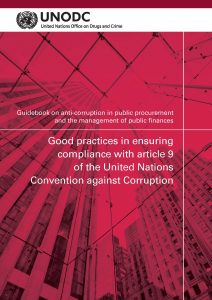
This Guidebook serves as a reference material for governments, international organizations, the private sector, academia and civil society, by providing an overview of good practices in ensuring compliance with article 9 of UNCAC, which requires establishing appropriate systems of public procurement, as well as appropriate systems in the management of public finances.
For more information please
download the document Eng
UN Instrument for Standardized International Reporting of Military Expenditures
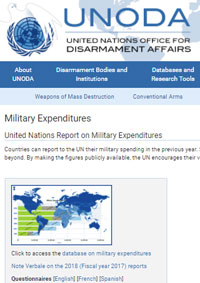
The purpose of the UN Standardized Reporting Instrument for Military Expenditures is to contribute to a broad effort to develop a set of specific measures for the purpose of facilitating the reduction of military expenditures. This tool also enhances transparency in military matters which is an essential element for building a climate of trust and confidence between States worldwide. The UN Standardized Reporting Instrument for Military Expenditures has also played an important role in acting as a model for similar reporting instruments, such as the one used by the Organization for Security and Cooperation in Europe (OSCE).
For more information please
visit the site



